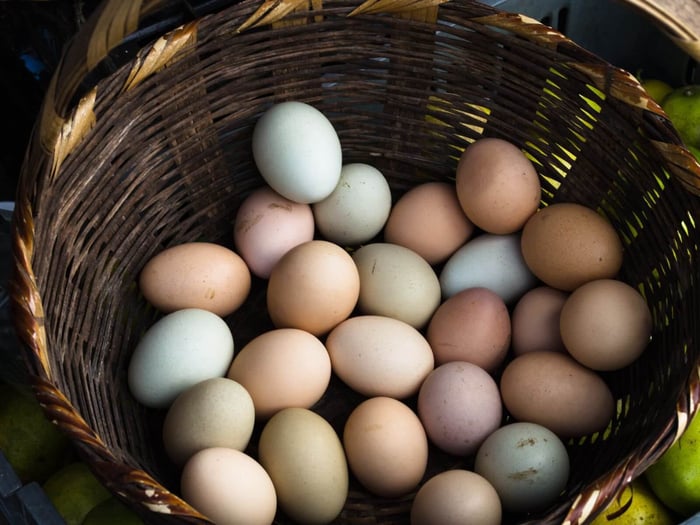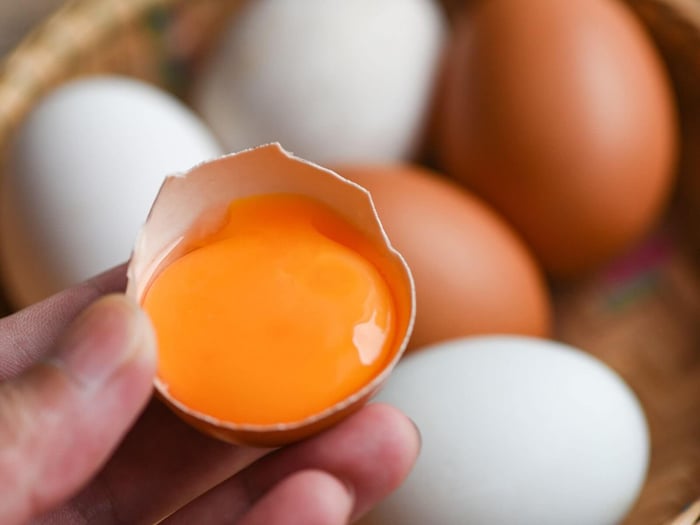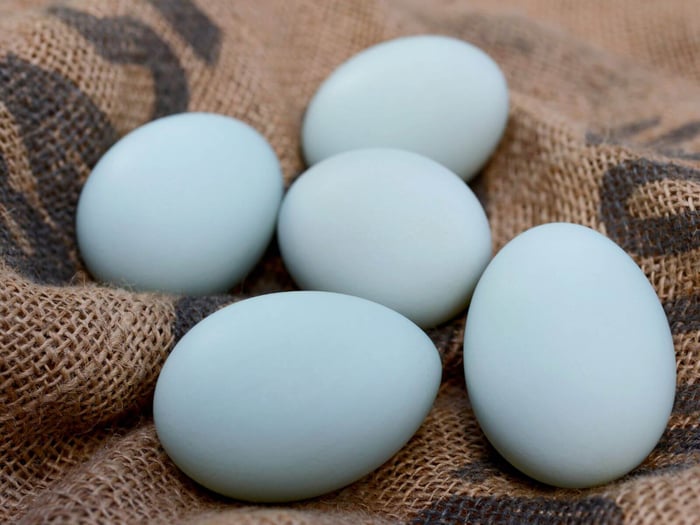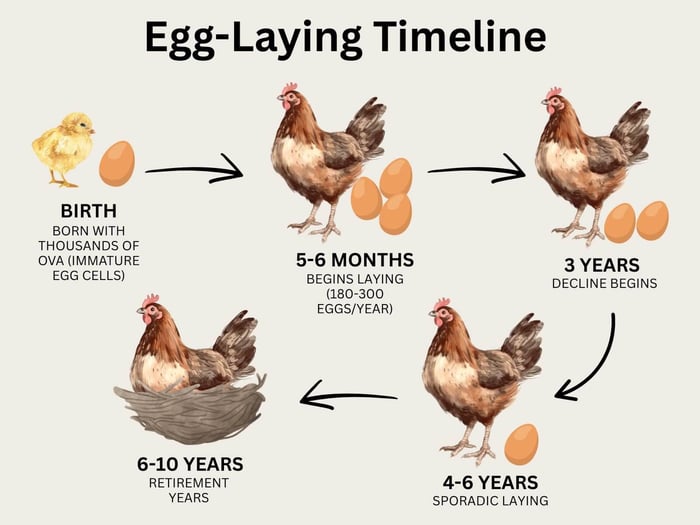 How Long Do Chickens Lay Eggs? A Complete Guide for Backyard Flock Owners
How Long Do Chickens Lay Eggs? A Complete Guide for Backyard Flock Owners
Raising chickens has become increasingly popular among homesteaders and suburban families alike. Whether you’re gathering eggs from your Rhode Island Reds each morning or watching your Silkies scratch around the garden, one of the most common questions that new chicken keepers ask is: how long do chickens lay eggs?
In this guide, we’ll explore the egg-laying lifecycle of hens—from their earliest days to retirement. We’ll also talk about what impacts egg production and how long your girls will keep giving you those golden yolks.
The Egg-Laying Basics: What Happens Inside a Hen
Every female chick is born with thousands of undeveloped yolks, called ova, inside her ovaries. As the hen matures, these ova begin to develop. By the time she's ready to start laying, a yolk will be released regularly from her ovary and travel through her reproductive system where it forms into an egg with whites, membranes, and a shell.
This internal process is largely governed by hormones and light exposure. When a hen reaches maturity—usually around 18 to 24 weeks of age—her body will begin this cycle regularly.
When Do Chickens Start Laying Eggs?
Most hens begin laying between 5 to 6 months of age, depending on breed. Some, like Leghorns or Golden Comets, may start earlier. Others, like Silkies or heritage breeds, may take longer.
Once your hen starts laying, you can expect regular production for the next couple of years, assuming she’s healthy and receiving enough light, nutrition, and care.
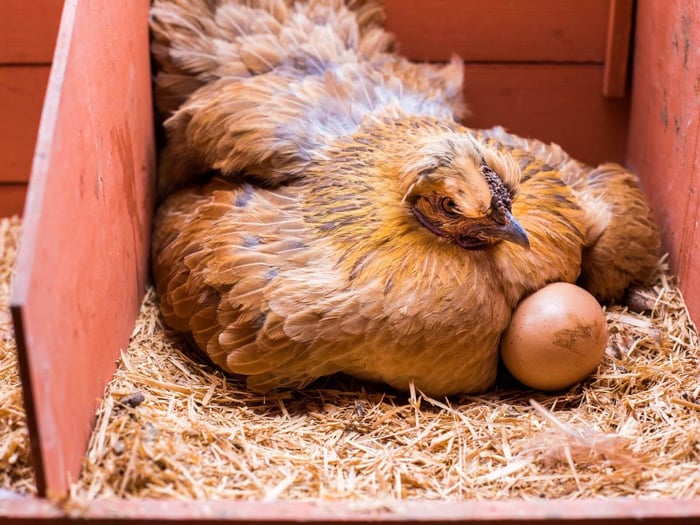
How Long Do Chickens Lay Eggs?
Let’s get to the main question: how long do chickens lay eggs? Most hens will lay consistently for the first 2 to 3 years of their life. After that, egg production slows down, though hens don’t stop laying entirely right away.
Here’s what to expect:
Year 1–2: Peak production. Depending on the breed, hens can lay anywhere from 180 to 300+ eggs per year.
Year 3: Noticeable decline begins. Egg size may increase slightly, but frequency drops.
Years 4–5+: Some hens still lay, but production is sporadic.
The decline in egg laying doesn't mean your hen is unhealthy—it’s just biology. She still has value in your flock, whether that’s as a bug-eater, garden helper, or companion.
Factors That Influence Egg Production
It’s important to understand that the timeline for how long chickens lay eggs can vary. Many internal and external factors play a role, including:
Breed: High-production breeds like Leghorns, Australorps, and ISA Browns are bred to lay more eggs but may burn out sooner. Heritage breeds lay fewer eggs but often continue laying longer into life.
Diet: Protein-rich, well-balanced feed supports healthy egg production. Deficiencies in calcium or protein can lead to fewer or lower-quality eggs.
Lighting: Hens need 14–16 hours of daylight to maintain peak laying. Less light in fall and winter results in fewer eggs.
Stress: Illness, predators, or coop changes can impact laying habits.
Molting: Each fall, hens shed and regrow feathers. During this time, egg laying slows or stops completely as energy shifts to feather production.
All these variables contribute to the broader answer of how long do chickens lay eggs, and why every flock is unique.
📸 Photo suggestion: Add a split image of a brightly-lit coop vs. a snowy, dimly lit one to demonstrate how lighting affects laying.
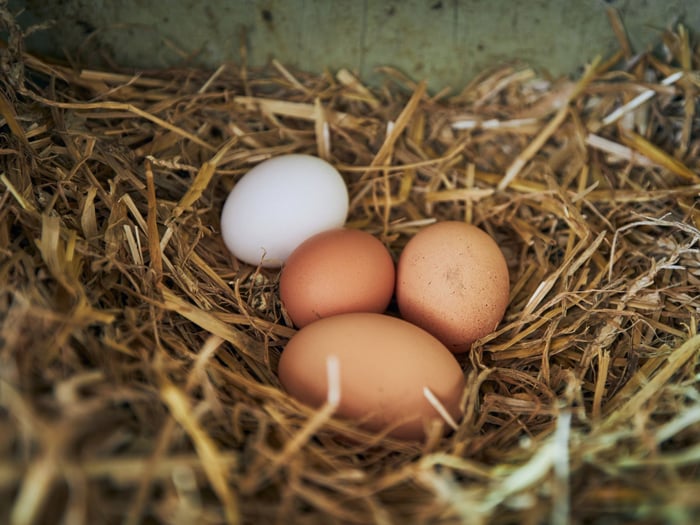 Seasonal Laying Patterns
Seasonal Laying Patterns
Hens are seasonal layers. During spring and summer, egg production peaks due to ample daylight and ideal conditions. Come fall and winter, especially during molting, production drops sharply or stops. This isn’t a cause for concern—it’s part of their natural rhythm.
If you want to extend the laying season, many chicken owners choose to add supplemental lighting to mimic longer days. However, there’s debate about whether that impacts long-term hen health.
When Do Chickens Stop Laying Eggs?
While the golden egg years are typically the first 2–3, hens don’t stop abruptly. Many continue to lay into their fourth, fifth, or even sixth year, albeit less frequently. The eggs may become more irregular in size, shape, or frequency, but they can still be perfectly healthy to eat. As hens age, their internal systems naturally slow down, and energy is diverted away from reproduction.
For most breeds, egg laying significantly declines after age three. Production becomes more irregular and can depend on individual health, genetics, and living conditions. Some hens may surprise you with a steady trickle of eggs well into their later years, while others may taper off quickly after their prime. Things like stress, illness, molting cycles, and diet can all impact when a hen decides she’s done laying for good—or just taking an extended break.
It’s worth noting that some hens will continue to lay a couple of eggs a week into their senior years. Others may stop altogether but live on for several more years. Just like people, every hen is a little different. Some chicken keepers choose to cull or rehome hens once they’ve stopped producing, while others happily let them live out their retirement as beloved pets or garden helpers. There's no one-size-fits-all approach—it all depends on your flock goals and values.
How Long Do Chickens Live?
A healthy backyard hen can live 6 to 10 years, with some living even longer under ideal conditions. However, breed plays a major role here, too. High-producing commercial hybrids—like ISA Browns or White Leghorns—often have shorter lifespans due to the intense demands of early egg production. Their bodies simply wear out sooner. In contrast, heritage breeds like Orpingtons, Barred Rocks, or Australorps tend to have a more gradual production curve and often live longer lives with fewer reproductive health issues.
Aside from breed, factors like housing, predator protection, climate, diet, and veterinary care will influence how long your chickens live. With a safe, enriched environment and attentive care, your hens can become long-term companions in your backyard.
Even when your hen stops laying, she can still provide companionship, fertilize the garden, and help control pests. Many chicken keepers choose to keep their “retired” hens for these reasons. Older hens are often calmer and more sociable, making them wonderful ambassadors for the flock—especially around kids or guests. Plus, their foraging and scratching behaviors continue to benefit the ecosystem of your yard or garden. Keeping older hens can be a meaningful part of your chicken-keeping journey, adding depth and joy to your homestead experience.
Summary: A Timeline of Egg Laying
Let’s recap the general egg-laying lifecycle:
Birth: Born with thousands of ova (immature yolks)
5–6 months: Start laying regularly
1–2 years: Peak egg production
3 years: Noticeable decline
4–6 years: Sporadic egg laying, depending on breed and health
6–10+ years: Possible retirement, but still a beloved member of the flock
Understanding how long do chickens lay eggs gives you realistic expectations and helps you plan your flock for long-term sustainability.
FAQs
At what age do chickens start laying eggs?
Most chickens begin laying between 5 to 6 months old, though this can vary by breed. High-production breeds often start earlier than slower-maturing heritage breeds.
How long do chickens lay eggs consistently?
Hens usually lay at peak production for the first 2 to 3 years. After that, egg frequency gradually declines, though some hens may continue laying sporadically for several more years.
What affects how long chickens lay eggs?
Factors like breed, diet, light exposure, stress, and health all influence egg production and its duration. Seasonal changes like molting and shorter daylight hours also play a role.
Do all hens stop laying at the same age?
No. Each hen is different. While many slow down after age three, some may continue laying into their sixth year depending on health, genetics, and environment.
What should I do with hens that stop laying?
Even after they stop laying, hens can serve valuable roles as garden helpers, pest controllers, and beloved pets. Many keepers choose to keep their retired hens in the flock.


.png)
